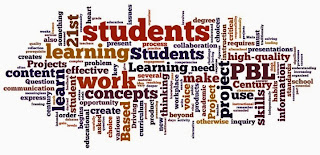Sunday, February 22, 2015
Blog Post #6
Project Based Learning:
After watching these videos, I started realizing how valuable all of this information could be for my future. The first two videos,Project Based Learning Part 1: Experiences of a 3rd Grade Teacher and Project Based Learning Part 2: Experiences of a 3rd Grade Teacher, really explained how PBL (Project Based Learning) is showcasing the act of learning. Anthony Capps goes into detail about how PBL is not simply showing what a student learned, but it is really a form of learning. I enjoyed Mr. Capps explaining what goes into an appropriate project. This was broken down in a way that I feel is helpful for students like myself. The components of a successful project are: student interest, community involvement (when necessary), authentic audience, and the project must be content driven. The "content driven" section of a project is what I feel most people tend to lack in. These components will drive students to work harder and dive into projects to show their full potential. As a future educator, that is all I can ask of my students.
The third video I watched was iCurio. This was the first time I had heard of iCurio. This is an educational search engine geared towards students. The interesting thing about iCurio is that it acts like a normal search engine, but it filters the results for educational purposes. Along with filtering for educational purposes, iCurio also stores content that a student finds valuable for their studies. This tool is very helpful when it comes to learning about virtual storage and organization, which is very important to me. Also, iCurio is geared towards younger children, so it is very useful in elementary classrooms. The content blocking aspect of this tool is key for elementary aged students. I would love to use iCurio in my future classrooms. Watching Discovery Education made me very interested in learning more. I am such a visual learner, and having visuals has always helped me to grasp a concept much faster than whenever a visual is not present. Anthony Capps uses a great example with his students. He encouraged his students to use Discovery Education with a project they were doing on plants. With this tool, students will be able to look closely at the differences in the plants and watch informative videos on the plants as well!
The Anthony-Strange list of Tips for Teachers Part 1 listed tips that all teachers should strive to do. Some of the tips are:
1: Teaching never ends
2: Be flexible and engaging
3: Reflect on your work and revise
4: Learning is constant
5: Have a goal
Don't Teach Tech- Use it explains the importance of technology with education. The video stresses that technology should be used as an aid with teaching, but that technology is not what they need to be taught. The students do need to be taught how to use the technology, but they should be taught one tool at a time. In Additional Thought About Lessons, Anthony Capps explained the four components that are required to make a lesson complete. These components are: daily plan, week plan, year plan, and unit plan.
Subscribe to:
Post Comments (Atom)

Hello Shelby! I definitely agree, as I watching this video, I realized how valuable this could be for my future also. It was all great information to know and learn. I had never heard of iCurio either but I thought it was very good and would be very useful. I also like the way you listed out their tips for teachers. Their tips are very helpful. Great post!
ReplyDeleteGreat post!
ReplyDelete